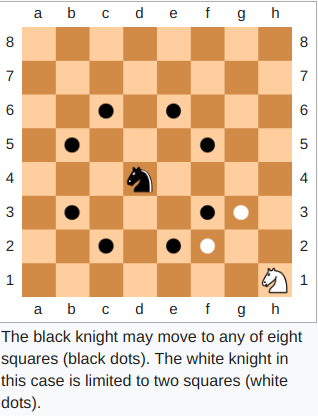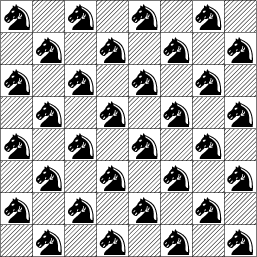In chess, a knight can move to any square that is two squares away horizontally and one square away vertically, or two squares vertically and one square horizontally. Therefore, its complete move looks like the letter "L".

The

Determine the validity of
Hints
A possible brute force solution generates a list of all knight coordinates on the board, and then checks their pairwise consistency. Unlike for
Racket
In Racket, implement the function
(valid? board)where board is a list of lists representing an arbitrarily sized board containing binary values, where 1 denotes a knight and 0 an empty cell; The function returns #t if and only if no knight threatens another one. Your file should be called knights.rkt and provide the valid? function.
Examples
(valid? ‘((1 0 0 0)
(0 0 0 1)
(1 0 0 0)
(0 1 0 0)))
#t
(valid? '((0 1 0 0)
(0 0 0 1)
(1 0 0 0)
(0 0 1 0)))
#fExam Solution
#lang racket
(provide valid?)
(define (generate-coords-row row offset row-id)
(if (null? row)
'()
(if (eq? (car row) 1)
(cons (cons row-id offset) (generate-coords-row (cdr row) (+ offset 1) row-id))
(generate-coords-row (cdr row) (+ offset 1) row-id))))
(define (generate-coords-board board offset)
(if (null? board)
'()
(append (generate-coords-row (car board) 0 offset) (generate-coords-board (cdr board) (+ offset 1)) )))
(define (valid-pair? coord1 coord2)
(let ((absx (abs (- (car coord1) (car coord2))))
(absy (abs (- (cdr coord1) (cdr coord2)))))
(cond ((and (eq? absx 1) (eq? absy 2)) #f)
((and (eq? absx 2) (eq? absy 1)) #f)
(#t #t))))
(define (valid-coord? coord coords)
(cond ((null? coords) #t)
((valid-pair? coord (car coords)) (valid-coord? coord (cdr coords)))
(#t #f)))
(define (valid-coords? coords)
(cond ((null? coords) #t)
((valid-coord? (car coords) (cdr coords)) (valid-coords? (cdr coords)))
(#t #f)))
(define (valid? board)
(let ((coords (generate-coords-board board 0)))
(valid-coords? coords)))Haskell
In Haskell, implement the function
isValid :: [[Piece]] -> Boolwhere
data Piece = Nil | Knight, withKnightdenoting a knight andNilan empty cell with no piece; Note, thePiecetype must be defined in your code.- The function input represents an arbitrarily sized board containing
NilandKnightpieces.
and the function returns True if and only if no knight threatens another one.
Your file should be called Knights.hs, contain a module of the same name, and export the isValid function.
Examples
> isValid [[Knight, Nil, Nil ,Nil],
[Nil, Nil, Nil, Knight],
[Knight, Nil, Nil, Nil],
[Nil, Knight, Nil, Nil]]
True
> isValid [[Nil, Knight, Nil, Nil],
[Nil, Nil, Nil, Knight],
[Knight, Nil, Nil, Nil],
[Nil, Nil, Knight, Nil]]
FalseExam Solution
module Knights (Piece (..), isValid) where
data Piece = Nil | Knight deriving (Show)
enumerate :: [a] -> [(Int, a)]
enumerate xs = zip [0 ..] xs
isKnight :: Piece -> Bool
isKnight Nil = False
isKnight Knight = True
knightCoords :: [[Piece]] -> [(Int, Int)]
knightCoords board = map (\(i, j, _) -> (i, j)) ij_ks
where
ij_ks = filter (\(_, _, k) -> isKnight k) (concat ij_xs)
ij_xs = map (\(i, jxs) -> insert' i jxs) (enumerate (map enumerate board))
insert' :: a -> [(b, c)] -> [(a, b, c)]
insert' x = map (\(y, z) -> (x, y, z))
isValidPair :: (Int, Int) -> (Int, Int) -> Bool
isValidPair (x, y) (u, v)
| ((abs (x - u)) == 2 && (abs (y - v)) == 1) = False
| ((abs (x - u)) == 1 && (abs (y - v)) == 2) = False
| otherwise = True
isValid :: [[Piece]] -> Bool
isValid board = and [isValidPair x y | x <- cs, y <- cs]
where
cs = knightCoords board